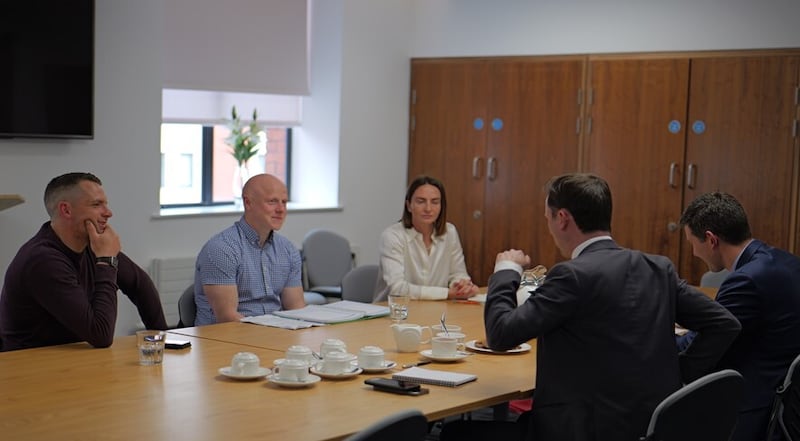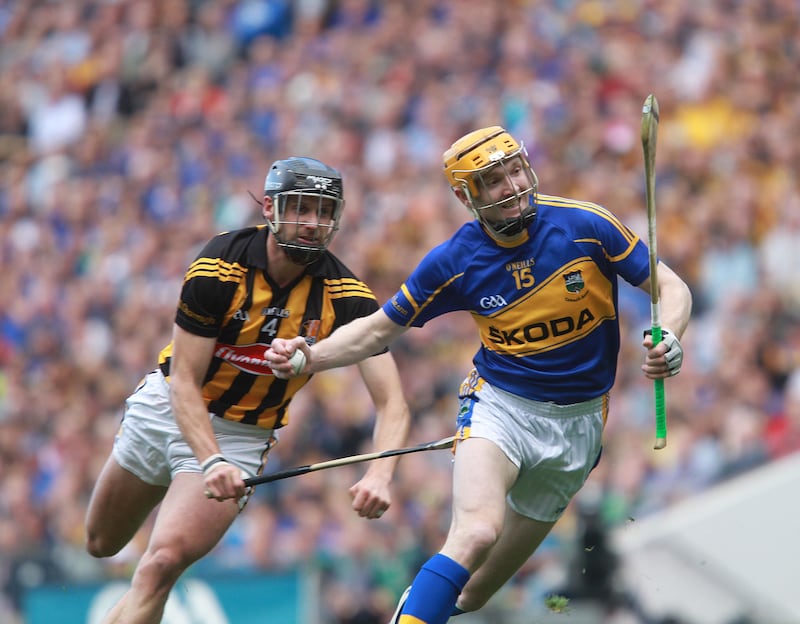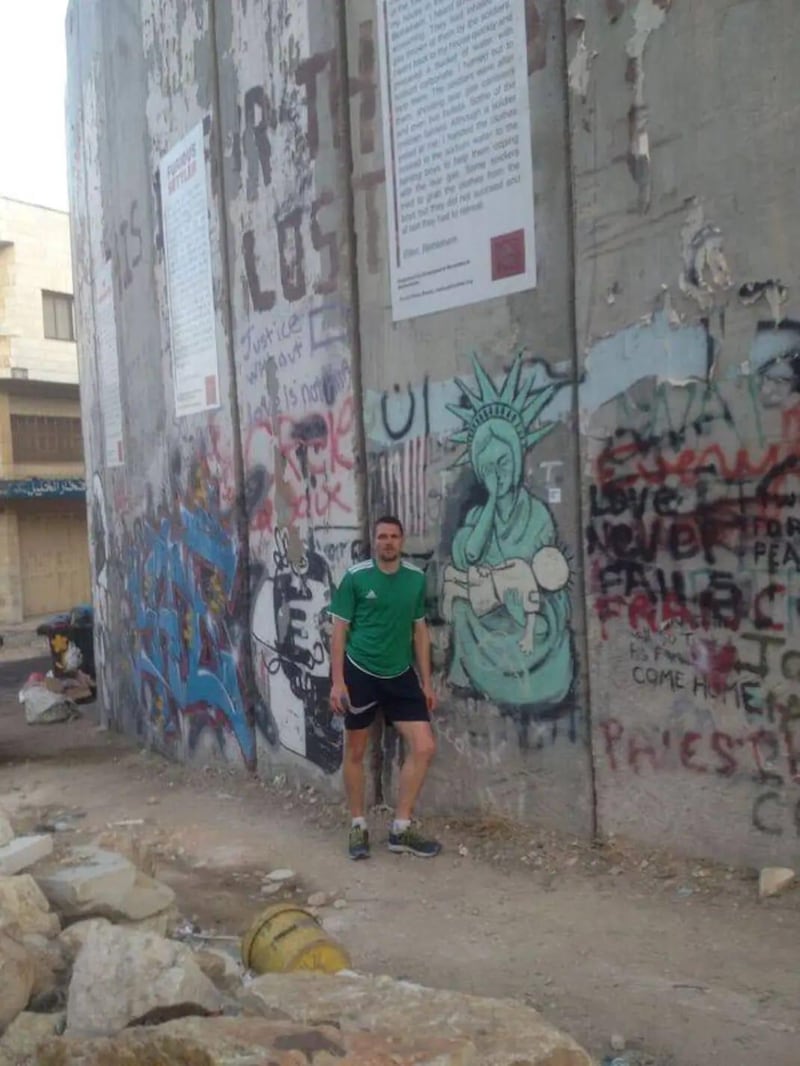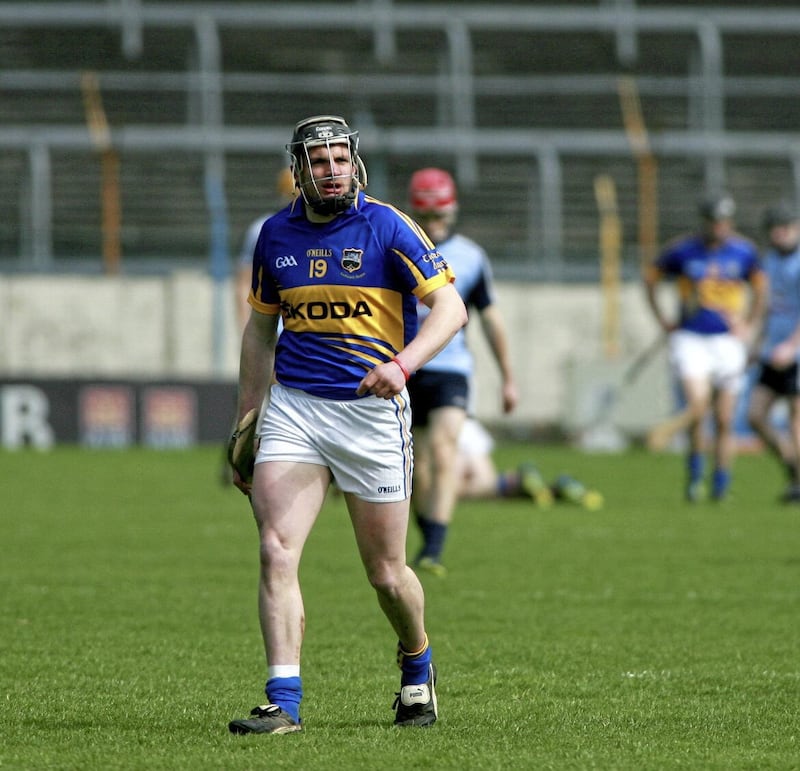TIMMY Hammersley paced up and down the Falls Road, two, three times maybe.
Breathe, Timmy.
“Do you know the way people talk about having a fear of public speaking? Well, multiply that by 10 times for someone who has a stammer,” Hammersley laughs.
Last summer, Tipperary’s 2010 All-Ireland winner was invited up to St Mary’s University to take part in a Gaels Le Chéile talk night – a Gael-on-Gael lobby group pressing for discussion around constitutional change and the creation of a citizens’ assembly.
All the way from the hurling heartlands of Clonoulty Co Tipperary, via Ballyboden St Enda’s in Dublin – where he still plays and works as a Coaching and Player Development Officer in all codes – to a small lecture theatre in St Mary’s speaking in front of an audience with remarkable clarity and passion about how the GAA must play a key role in imagining a better, fairer Ireland for all its citizens.
There are many facets to Timmy Hammersley: a hurler, a coach, a human rights activist, a charity worker, a passionate supporter of empowering young people and a curious soul.
“Timmy is a great man,” says ex-Antrim hurler Neil McManus. “He’s on the right side of everything.”
“Timmy is a really good person,” says his former Tipperary team-mate Darren Gleeson. “A caring person who is interested in where people are going in life, not just in what direction they’re taking in sport, which is a really good sign in him.
“Timmy was with us in Tipp and got his All-Ireland medal in 2010, a well-deserved one. A fantastic hurler with his club Clonoulty Rossmore. Any time you’d look at the scoresheet after a game, you’d be looking at Timmy with 1-10 scored.
“He was very determined, and it probably didn’t come easy for Timmy to get into the Tipp panel as he was a lighter forward, used to playing centrally for Clonoulty which was a big thing to take on.
“And when you’re trying to get into a Tipp forward line with Eoin Kelly and Lar Corbett there, it was never going to be easy. One thing I’d say about Timmy is, he’s a never-give-up type of person.”
...
TIMMY is out walking when he takes this call from The Irish News – but it’s too windy and the mobile phone line crackles and breaks up. So, you ask him to abort his walk and he politely complies.
Born and bred in Clonoulty, Co Tipperary – a small rural village only a few miles commute to Thurles, Cashel and Tipperary town – Hammersley has three brothers.
His father runs a butcher’s shop in the village and his mother works with children with disabilities.
Because of his stammer, he cannot pronounce his mother’s name.
So, he spells it instead.
“H-E-L-E-N… I don’t mind you saying I had to spell my mother’s name,” he says matter-of-factly.
“There are some words I’m challenged by and that’s just the reality.”
Fiercely articulate with a boundless vocabulary - and yet some words just beat him.
His childhood was pockmarked by some excruciating experiences, but through different techniques, he’s much more in control of it these days.
“You heard me at the Gaels Le Chéile event and you probably heard me stutter in that,” he says. “For things like that, I would have to prepare for; like getting ready to play a match.
“Breathing exercises. In fact, anything that makes me feel good, generally, would help a lot before speaking in public.
“Before that event, I actually walked up and down the Falls Road two or three times.”
You ask: “Is that why you wanted to walk while doing this interview?”
“Exactly, Brendan, yeah.”

The clinical reasons behind stammers manifesting in children and enduring into adulthood are largely unknown.
Timmy can never be sure how his developed, but cites the traumatic events surrounding his younger brother, Kieran, who underwent two liver transplants and was later diagnosed with cancer at just five-years-old.
Only for his health problems, his younger sibling was easily the best hurler in the Hammersley household. Kieran is currently coaching at senior level in Cork.
Conor, Timmy’s younger brother again, was part of the 2019 Tipperary squad that claim the Liam MacCarthy.
“I’m three years older than Kieran and that would have been a traumatic kind of time growing up – seeing him go off to England for two transplants, and I have images of being woken up at all hours, parents having to go to the UK and driving up to Dublin Airport.
“That’s stuff I’ve never forgotten. It’s not as if I’ve overly researched it but most of the stuff I’ve read is stammers are often developed by traumatic incidents or experiences in childhood.
“Those things would have caused some trauma and that is the most likely reason why I developed a stammer. I do feel I have greater control over it than I previously had.
“The only time I got slagged about it face-to-face was by a teacher in Thurles Secondary School,” he adds.
“I always put my hand up to ask a question and I stammered particularly badly one day. The next time I put my hand up, the teacher said: ‘It took you an hour to answer the previous question – why would I allow you to answer again?’
“I remember those words. I made sure I brought it up to other teachers.
“I understood how much of a bollocks he was. He obviously upset me but not overly and I was aware enough to know it was his issue – not mine.
“But I would speak highly of Thurles CBS, it was a very good environment, particularly for someone who was into GAA. Even though I was the guy with a stammer, I was always determined to have my voice. I would never have been shut up too easily.”
And there was plenty of support along the road too.
He remembers having to deliver a presentation in college and what should have taken 10 minutes lasted the entire class time.
“Oh God. My speech was totally out of control – and that would have been a pretty downtrodden experience. But I remember the lecturer at the time saying: ‘Fair play getting through it’.”
...
LIKE any young fella growing up in Tipperary with a hurl in his hand, Hammersley’s “be-and-end-all” was to play for his county.
Throughout his school years he was always “on the verge” of making teams.
At U14 and U16 level, he didn’t get a sniff of a Tipperary jersey – but he broke into his school’s Harty Cup team in fifth year before starring for Waterford IT in Fitzgibbon.
“There were fellas in secondary school and at the club who were way ahead of me – they would have been stars on Tipp U16s or minor squads. Suddenly, they weren’t there, and I was.”
Hammersley was the kind of individual who had to work that little bit harder than others to be in his coach’s eye-line.
“I definitely wasn’t the most talented hurler growing up. I was small, I was a late developer. The first time I ever put on a county jersey was at U21. I had to work very, very hard to get where I did – very hard in all aspects.
“From 2002 to 2010, when I won an All-Ireland medal with Tipp, I put in as much effort as any young fella could have put in.”
It seems slightly unfair to focus on the perceived limitations of any of the 2010 panellists in what was a golden generation of Tipp forwards – Eoin Kelly, Lar Corbett, John O’Brien, Seamus Callinan, Noel McGrath, Patrick ‘Bonner’ Maher and Gearoid Ryan among them.
“Ultimately, to break into that was difficult,” he says. “The context was that I was part of the strongest Tipp team in the last 30 years and definitely the strongest forward line.
“There were another six or seven players of really good quality, and I could name a whole pile of them as well.
“If we’d been around two or three years before them [the starting forwards] or four or five years after them we would’ve possibly been on the team as well.”
Kilkenny had dominated the Liam MacCarthy in the mid-to-late ‘Noughties’, beating Tipp in the ‘09 decider, and the whole country was talking about their ‘drive for five’ the following year.
In 2010, though, Lar Corbett was on a different level from everyone else, scoring three memorable goals to down Kilkenny in the All-Ireland final.
Noel Hickey just couldn’t contain him.

“I was sitting beside Timmy in the dug-out in the 2010 final,” Gleeson recalls, “and when we got the first goal everyone jumped up, and Timmy was so excited he hit me a box in the chest and winded me!”
Noel McGrath grabbed Tipp’s other goal, Eoin Kelly chipped in with seven placed ball conversions while Richie Power offered resistance with 1-9 for Kilkenny.
It was a sweet All-Ireland victory for Liam Sheedy’s side in 2010, especially having crashed out of Munster earlier that year to Cork before building momentum through the back door.
For Hammersley, Lar Corbett was the catalyst.
“Lar Corbett was so much more than just training and preparation – he was on a journey, I don’t know how to describe it,” Timmy says.
“He did less than anyone else, training-wise... Even the week before the All-Ireland final we had a training match up in Carlton House, Lar didn’t play, he pucked the ball against the wall.
“He wasn’t a person who took the gym overly seriously either. I remember him trying to squat in the gym one time and he was all over the place. He’d absolutely no interest in squatting but his head strength was unbelievable. He was pure determination, pure talent.”
Hammersley admits that his time with Tipperary - which included being dropped from the panel twice, once by Declan Ryan, before being recalled the following season and by Eamonn O’Shea - weren’t the most fulfilling years of his life.
Inter-county hurling was more than a past-time; it was all-consuming. And yet, leaving it behind in 2014 was a vulnerable period for him.
“I thought winning an All-Ireland and being part of the squad would make me a fulfilled person but that didn’t turn out to be the case.
“I’d given everything to sport and to Tipp and it was coming to an end. When I was dropped by O’Shea that was absolute closure then. I knew playing at that level was over.
“It was a reconciling period, where you’re left thinking: Who am I now?
“Even though I’d have a lot of other interests, my life was about playing inter-county hurling for Tipp.
“People might not understand it but when your identity is based around a hurler or trying to be an inter-county hurler and when you’re basically told that’s no longer for you, it is a vulnerable period.
“I’m not the only one who goes through that… Obviously the GAA is a wonderful thing – it brings so much to communities – but there is a question mark over the identity it creates and how we bring young people up maybe, that this is what you should attain.
“I’m now living in Dublin, but I think the identity in a rural environment is potentially more entrenched than it is in an urban area because when you’re growing up in a small rural village hurling is the be-and-end-all, and people perceive you as a hurler and people judge you as a hurler.”
Roughly six weeks after experiencing the high of winning an All-Ireland medal with Tipp, Hammersley’s club Clonoulty Rossmore lost a county final to Thurles Sarsfields – “a bad day all round”.
Nothing stings more than criticism from your own. In the aftermath, Hammersley took his fair share.
‘Who do you think you are trying to play for Tipp - and you can’t even turn up for the club?’
In 2018, Clonoulty Rossmore won a county championship with Timmy and brothers James and Conor on the team. Redemption.
“You’re basing yourself on an identity that is so vulnerable and so changeable, and it isn’t even real,” he says.
He later availed of the counselling services of the GPA while at the same time a whole new social space was opening up for him.
He moved to Dublin and stumbled across the Soar Foundation, founded by former Clare hurler Tony Griffin and Karl Swan in 2012, which engages and empowers young people to reach their potential.
Hammersley reached out to Griffin and Swan and threw himself into their work.
Eight years in Dublin, the big smoke and Ballyboden St Enda’s feel like home now.
“Up until that period, I probably wasn’t friendly with anyone who wasn’t a hurler or a GAA person. Suddenly there was another group of people from different backgrounds I became friendly with – people who didn’t give a damn about a GAA match. If I had a poor match on Sunday, they didn’t actually care.
“I do think when you risk, you’re showing your vulnerabilities, you’re getting out of your comfort zone and from that I became a more aware person and, hopefully, a better person and that was the impact Tony Griffin had on me.”

Last October, he played in the Dublin SHC final for Ballyboden. They were beaten out the gate by Na Fianna in Parnell Park. The defeat stung but nobody died. Life went on.
Timmy Hammersley keeps trucking on. Still hurling at 35. Still coaching. Still curious about the world around him. Still learning. And still living out of his comfort zone. For him, it’s the only place to be.
He’s still highlighting injustice at home and abroad, marching for the rights of the Palestinian people and hoping the Israeli genocide will end.
On a 2015 visit to the West Bank, he saw Israeli kids as “young as 10″ with guns - “They could take a potshot at a Palestinian any time they want, and no-one would say a word. They are things you don’t forget.”
Hurling, Clonoulty-Rossmore and Tipp will always course through his veins - but as it turned out, it wasn’t his only raison d’etre.
“Letting go of it was one of the best things that ever happened me, I would go as far to say,” he says.
“But, that said, you meet so many good people at inter-county too - people like Paudie O’Neill who was a Tipp coach for a while and is now a great friend with both of us working in Ballyboden.
“And when I look back being in the Hogan stand and particularly when Pat Kerwick sang Galtee Mountain Boy after beating Kilkenny in the All-Ireland final, that was just an unbelievable place to be. But, do I view it as an extremely happy time? I probably don’t.
“A lot of it would be pressure from the outside but self-induced pressure as well. You realise now that there are other things to do.”
Darren Gleeson recalls a moment in the 2010 season when Cork had built up an unassailable lead in the opening half of their Munster Championship clash.
“Tipp were well beaten by half-time if I’m honest,” Gleeson says.
Introduced in the second half and wearing number 20, Hammersley picked up a loose ball, swivelled and fired between Cork’s posts.
But the umpire waved it wide.
“I remember Timmy went mad and he chased in across the goal to challenge the umpire,”
Gleeson recalls. “The umpire was actually over-ruled by the linesman. But it just shows the fight and determination he had in him. There was no lost cause with Timmy.”


